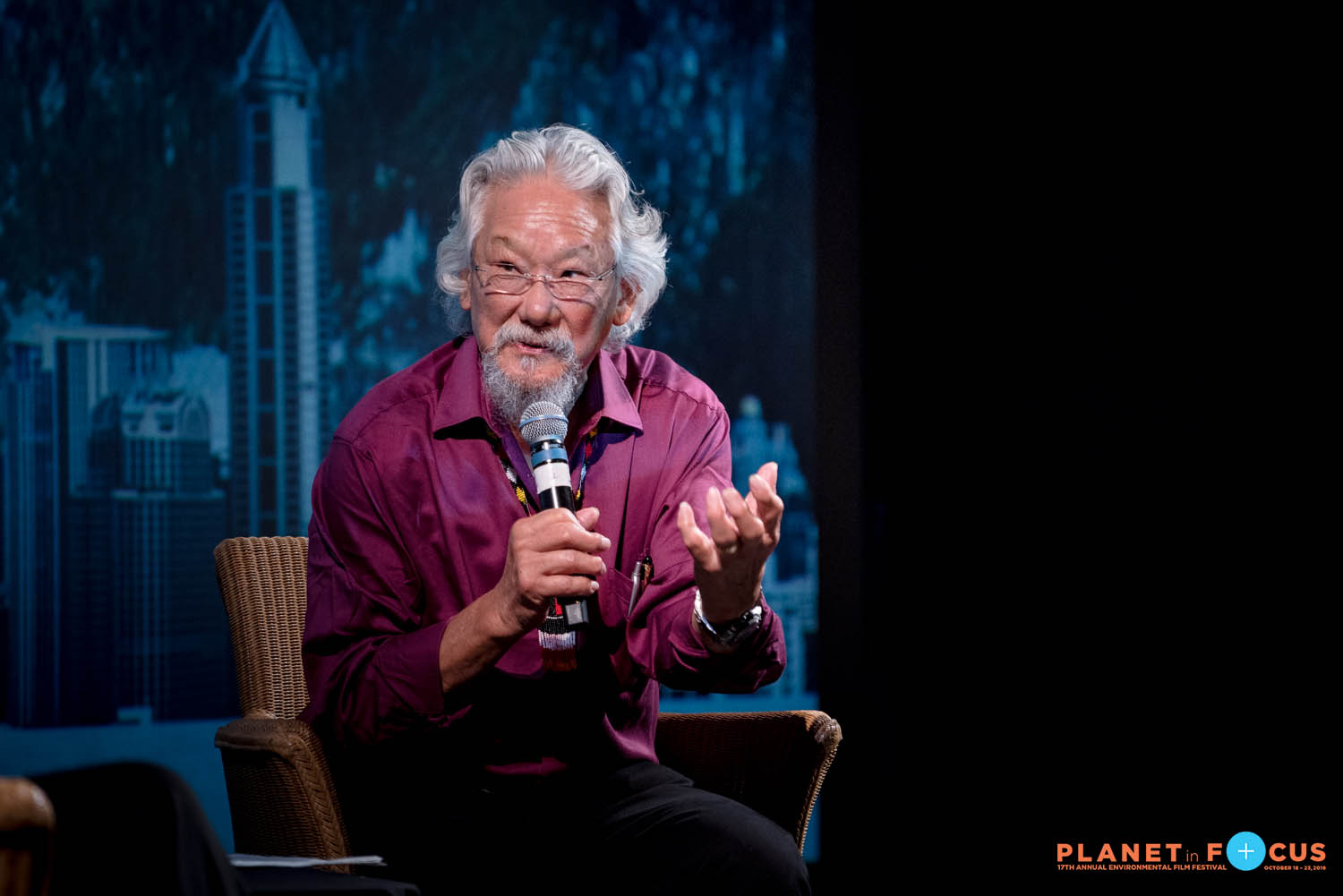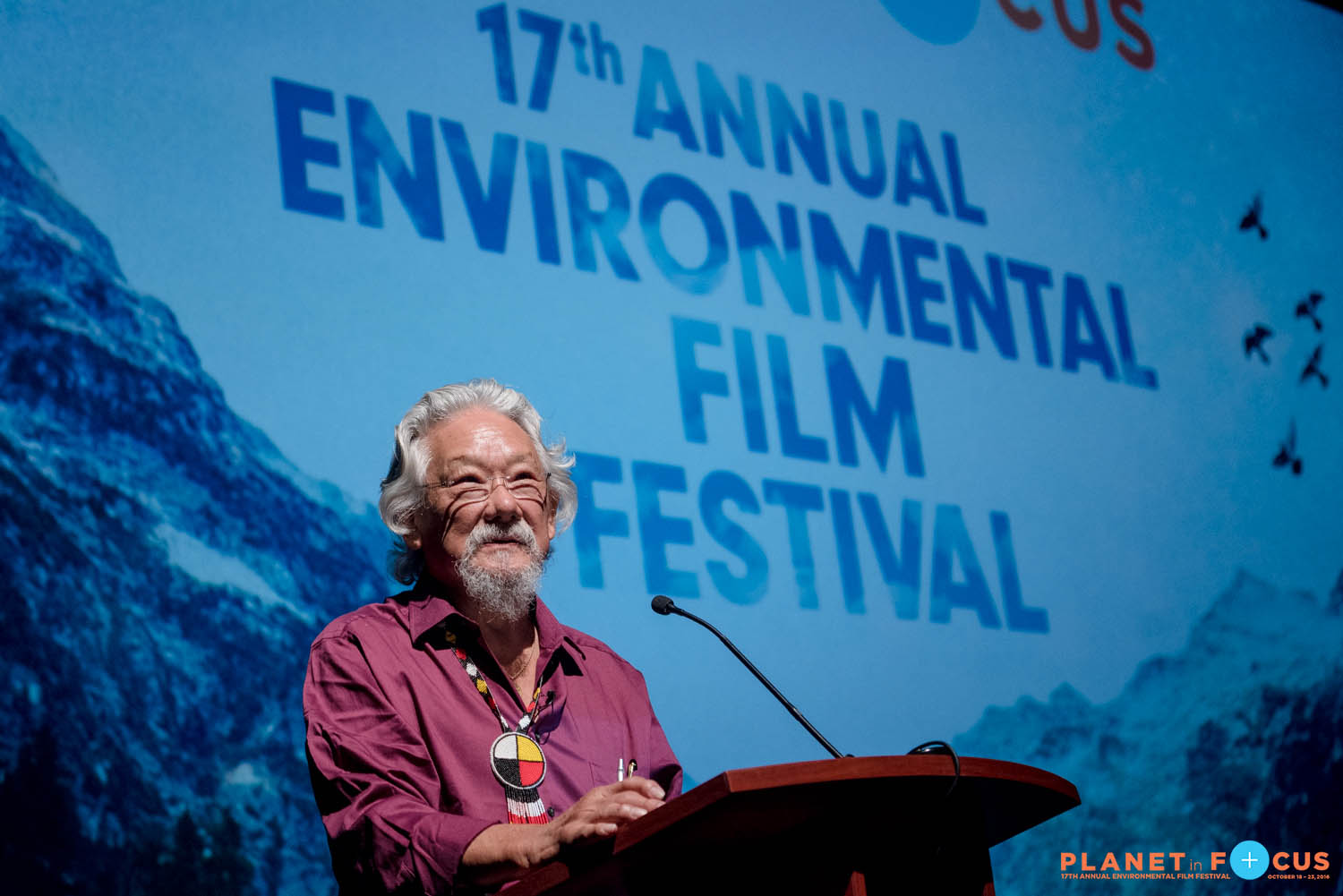On Tuesday October 18, I sat down with renowned scientist, environmentalist and broadcaster David Suzuki to discuss some of the challenges plaguing environmentalism in Canada today. Suzuki was in Toronto as part of the Planet in Focus Environmental Film Festival (Oct. 18 to 23, 2016) where he was named the 2016 PiF Canadian Eco-Hero. We met after his round table discussion with 10 of this country’s leading young environmentalists.
Phillip Dwight Morgan: How do we reconcile Canada’s subscription to the myth of abundance with the fact that we’re involved in so many extractive and environmental degrading practices?
David Suzuki: We constantly pitch Canada as this big country with a small population — 35 million is not a small population. And, if you look where most Canadians live, we live within 100 km of the border with the U.S. We’re hugging that border because most of Canada is buried under rock, snow or ice. So, it’s an illusion to think that we’re this big country. But we’ve evolved, as the United States has, as a country extracting these abundant resources and now we’re paying the price. I mean, the consequences of our thoughtless extraction is that a lot of this stuff is non-renewable when it should be [renewable] — like our forests and our fish — but we’re getting into the more destructive extraction, which is mining. And it’s not just here in Canada. The worst mining in the world are Canadian companies. They’re going all over the damn place. It’s disgusting.
PDM: You’ve been doing this kind of work for a long time. Where are we at right now? How do you situate this moment in time in the history of Canadian environmentalism?
Suzuki: We’re like the rest of the world. We’re at a critical point that is dictated by factors far beyond Canada and that’s the climate crisis. There are people now — very, very reputable scientists — that say it’s too late. We’ve passed too many tipping points. Indeed, there’s one retired ecologist from Arizona that said he’s actually put a timeline on when we’re not going to be here. And it’s too soon; I’m not even going to tell you when it is. I was just knocked down when I heard him talk.
But, I feel we can’t go around saying it’s too late. Say it’s urgent, we have very little time — and we do have very little time to make critical decisions. And Trudeau, he’s made a big step in Paris but we’ve got to start reducing now and he’s still playing games with pipelines and expanding opening of the Tar Sands. All of that should be off of the agenda.
PDM: How do feel about the current government and its position on the environment? I mean, it’s leaps and bounds above the Harper Government…
Suzuki: We’re so relieved by the replacement of Harper. I mean Harper was an oppressive government. He was directly going after environmentalists; it was a terrible time. But Trudeau did the first — and I just realized it’s been a year since he took power…the first six months were like paradise. First of all, the decision of gender equity in parliament — huge decision. Huge. And then going to Paris and taking a strong position on the Paris agreement — huge. And then his elevation of Indigenous issues to the top of his agenda: those are all huge things he’s done.
Now I think he’s got to continue to unravel a lot of the destructive aspects of the Harper government. He’s going to have to make some big decisions. Harper cancelled the Navigable Waters Act; Harper cancelled all kinds of legislation protecting the oceans and our freshwater. That’s all got to be overturned. He’s got to change Bill C-51; he hasn’t done anything. He’s got to bring in legislation for proportional representation. That’s going to be a big one. He’s got to bring in legislation on marijuana; that’s a big one. He’s got a lot, a lot of promises he’s made that he’s got to deliver. But the most important thing now is that we’ve got to get on a path to knocking fossil fuels out of our economy. That’s the big one.
PDM: How do you feel about media coverage of climate change and environmental crisis? Has media coverage been adequate?
Suzuki: The problem with the media is that the media have the concentration span of a hummingbird. So some major thing happened and it may be a three-day news event but then it disappears. And, the media look at the world in a fractured way: You know, like a flood in Bangladesh, forest fires in the United States, tornadoes in Japan… These are all reported as these tragic, tragic events but the papers don’t and the media don’t hook them up to say “hey! Look! This is all about climate.”
Every day the media faithfully report the DOW Jones average, the SNP, the value of a loonie to the fourth decimal point like you’d think that this is really critical information but they never tell you how many tonnes of carbon dioxide are put in the atmosphere, how many species have disappeared, how many acres of forest have been destroyed…
We should have that on every paper on the front page every day. If you look at the way we divide our reporting now: politics, business, sports, celebrity. Those are usually areas that have their own sections. But is there anything about environment? Climate? They’re just kind of the corner bits and pieces.

PDM: What do you have to say to people in their 40s, 50s and 60s who are of an older generation that may not have their finger on the pulse of what’s happening environmentally?
Suzuki: Yeah, what I’ve found is when people go to university, they get a job, they buy a house, they get married, they have kid and environmentalists come along and say “look, you’ve got to change your ways,” They get pissed off. They’re invested a lot of effort to get where they’re comfortable and then to suddenly be told you can’t go on living this way, they don’t like that. Especially from between 30 and 50 — man! — getting them to see…
But, they have one Achilles heel.
PDM: What is it?
Suzuki: Children. That’s why I told these kids at the very end, you have got to recruit mom and dad. They have to become eco-warriors. Parents have got to be heavily involved in the political process. We need big decisions at the level of government.
PDM: The TPP: I’ve asked Maude Barlow and a bunch of other people about this and …
Suzuki: They know all about it. I don’t know the details of the TPP except, it seems to me, it’s just a continuation of NAFTA. These agreements are all geared not to protect people. They’re geared to protect corporations. Open up markets to corporations that will supersede local employment laws, Local environmental protection laws — all that stuff is subsumed by these international trade agreements. They’re all about the corporate agenda.
And, you know, you’re finding out here in Ontario that your government is kind of helpless to doing anything about Nestlé getting their water practically free that is going to be needed in the coming years because of NAFTA and free trade agreements. So, I think that all of these have to be opposed and the irony, of course, is that Donald Trump opposes it too.
PDM: Can you discuss the role of Indigenous knowledge in environmental protection?
Suzuki: Critical. It is the driving force because it is place-based and the knowledge has been accumulated over thousands of years. That’s why Indigenous people value elders. Elders are the repository of knowledge and they remember their elders and they remember all of them. They remember all of the places they’ve fucked up, their successes, their mistakes. All of that is a part of Indigenous knowledge so that they’re the only people that have a track record of living sustainably anywhere on the planet.
The last 500 years of exploration have been absolutely destructive. You get Europeans going to North America, South America, Africa, Australia. And, in every place these explorers encounter Indigenous people, the attitude was “they’re inferior.” Indeed, if you look at the way Aborigines were treated in Australia, they were treated as flora and fauna. They called Australia “empty” because they didn’t consider them human. And, if you look at the record of the way Europeans have treated these conquered people, they killed them like they were animals. So they learned nothing from them.
You know, I think of the Artic explorers, these English explorers that said “we’re not going to wear furs like these Eskimos up there. We’re going to wear hobnail boots and go up there” — and they froze! They froze to death! You think of the first people that came down the St. Lawrence. They did know how to overwinter; it was the Indigenous people that kept them alive. But, over and over they had such contempt for these people, they didn’t learn anything.
British Columbia, the people came and said “these people are so primitive. They don’t have any agriculture.” But, of course, they were living off of the oceans which were rich with food. Only in the last 10 years, we’ve discovered clam gardens. They were farming the oceans. But we were so arrogant; we didn’t think they were smart enough to do that. We looked at the world through our idea of what a garden is.
I think the last 500 years have been unbelievable destructive for the planet because of the spread of this idea of exploration, conquest, and colonization.
Phillip Dwight Morgan is a published author of poetry and short essays. He views writing as an opportunity for self-discovery, emancipation and nourishment.
Like this article? rabble is reader-supported journalism. Chip in to keep stories like these coming.



